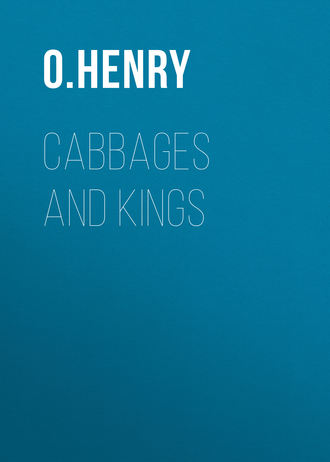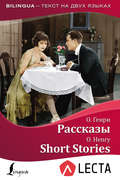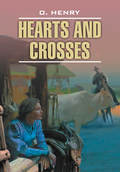
О. Генри
Cabbages and Kings
V
CUPID'S EXILE NUMBER TWO
The United States of America, after looking over its stock of consular timber, selected Mr. John De Graffenreid Atwood, of Dalesburg, Alabama, for a successor to Willard Geddie, resigned.
Without prejudice to Mr. Atwood, it will have to be acknowledged that, in this instance, it was the man who sought the office. As with the self-banished Geddie, it was nothing less than the artful smiles of lovely woman that had driven Johnny Atwood to the desperate expedient of accepting office under a despised Federal Government so that he might go far, far away and never see again the false, fair face that had wrecked his young life. The consulship at Coralio seemed to offer a retreat sufficiently removed and romantic enough to inject the necessary drama into the pastoral scenes of Dalesburg life.
It was while playing the part of Cupid's exile that Johnny added his handiwork to the long list of casualties along the Spanish Main by his famous manipulation of the shoe market, and his unparalleled feat of elevating the most despised and useless weed in his own country from obscurity to be a valuable product in international commerce.
The trouble began, as trouble often begins instead of ending, with a romance. In Dalesburg there was a man named Elijah Hemstetter, who kept a general store. His family consisted of one daughter called Rosine, a name that atoned much for "Hemstetter." This young woman was possessed of plentiful attractions, so that the young men of the community were agitated in their bosoms. Among the more agitated was Johnny, the son of Judge Atwood, who lived in the big colonial mansion on the edge of Dalesburg.
It would seem that the desirable Rosine should have been pleased to return the affection of an Atwood, a name honoured all over the state long before and since the war. It does seem that she should have gladly consented to have been led into that stately but rather empty colonial mansion. But not so. There was a cloud on the horizon, a threatening, cumulus cloud, in the shape of a lively and shrewd young farmer in the neighbourhood who dared to enter the lists as a rival to the high-born Atwood.
One night Johnny propounded to Rosine a question that is considered of much importance by the young of the human species. The accessories were all there – moonlight, oleanders, magnolias, the mock-bird's song. Whether or no the shadow of Pinkney Dawson, the prosperous young farmer, came between them on that occasion is not known; but Rosine's answer was unfavourable. Mr. John De Graffenreid Atwood bowed till his hat touched the lawn grass, and went away with his head high, but with a sore wound in his pedigree and heart. A Hemstetter refuse an Atwood! Zounds!
Among other accidents of that year was a Democratic president. Judge Atwood was a warhorse of Democracy. Johnny persuaded him to set the wheels moving for some foreign appointment. He would go away – away. Perhaps in years to come Rosine would think how true, how faithful his love had been, and would drop a tear – maybe in the cream she would be skimming for Pink Dawson's breakfast.
The wheels of politics revolved; and Johnny was appointed consul to Coralio. Just before leaving he dropped in at Hemstetter's to say good-bye. There was a queer, pinkish look about Rosine's eyes; and had the two been alone, the United States might have had to cast about for another consul. But Pink Dawson was there, of course, talking about his 400-acre orchard, and the three-mile alfalfa tract, and the 200-acre pasture. So Johnny shook hands with Rosine as coolly as if he were only going to run up to Montgomery for a couple of days. They had the royal manner when they chose, those Atwoods.
"If you happen to strike anything in the way of a good investment down there, Johnny," said Pink Dawson, "just let me know, will you? I reckon I could lay my hands on a few extra thousands 'most any time for a profitable deal."
"Certainly, Pink," said Johnny, pleasantly. "If I strike anything of the sort I'll let you in with pleasure."
So Johnny went down to Mobile and took a fruit steamer for the coast of Anchuria.
When the new consul arrived in Coralio the strangeness of the scenes diverted him much. He was only twenty-two; and the grief of youth is not worn like a garment as it is by older men. It has its seasons when it reigns; and then it is unseated for a time by the assertion of the keen senses.
Billy Keogh and Johnny seemed to conceive a mutual friendship at once. Keogh took the new consul about town and presented him to the handful of Americans and the smaller number of French and Germans who made up the "foreign" contingent. And then, of course, he had to be more formally introduced to the native officials, and have his credentials transmitted through an interpreter.
There was something about the young Southerner that the sophisticated Keogh liked. His manner was simple almost to boyishness; but he possessed the cool carelessness of a man of far greater age and experience. Neither uniforms nor titles, red tape nor foreign languages, mountains nor sea weighed upon his spirits. He was heir to all the ages, an Atwood, of Dalesburg; and you might know every thought conceived in his bosom.
Geddie came down to the consulate to explain the duties and workings of the office. He and Keogh tried to interest the new consul in their description of the work that his government expected him to perform.
"It's all right," said Johnny from the hammock that he had set up as the official reclining place. "If anything turns up that has to be done I'll let you fellows do it. You can't expect a Democrat to work during his first term of holding office."
"You might look over these headings," suggested Geddie, "of the different lines of exports you will have to keep account of. The fruit is classified; and there are the valuable woods, coffee, rubber – "
"That last account sounds all right," interrupted Mr. Atwood. "Sounds as if it could be stretched. I want to buy a new flag, a monkey, a guitar and a barrel of pineapples. Will that rubber account stretch over 'em?"
"That's merely statistics," said Geddie, smiling. "The expense account is what you want. It is supposed to have a slight elasticity. The 'stationery' items are sometimes carelessly audited by the State Department."
"We're wasting our time," said Keogh. "This man was born to hold office. He penetrates to the root of the art at one step of his eagle eye. The true genius of government shows its hand in every word of his speech."
"I didn't take this job with any intention of working," explained Johnny, lazily. "I wanted to go somewhere in the world where they didn't talk about farms. There are none here, are there?"
"Not the kind you are acquainted with," answered the ex-consul. "There is no such art here as agriculture. There never was a plow or a reaper within the boundaries of Anchuria."
"This is the country for me," murmured the consul, and immediately he fell asleep.
The cheerful tintypist pursued his intimacy with Johnny in spite of open charges that he did so to obtain a preëmption on a seat in that coveted spot, the rear gallery of the consulate. But whether his designs were selfish or purely friendly, Keogh achieved that desirable privilege. Few were the nights on which the two could not be found reposing there in the sea breeze, with their heels on the railing, and the cigars and brandy conveniently near.
One evening they sat thus, mainly silent, for their talk had dwindled before the stilling influence of an unusual night.
There was a great, full moon; and the sea was mother-of-pearl. Almost every sound was hushed, for the air was but faintly stirring; and the town lay panting, waiting for the night to cool. Offshore lay the fruit steamer Andador, of the Vesuvius line, full-laden and scheduled to sail at six in the morning. There were no loiterers on the beach. So bright was the moonlight that the two men could see the small pebbles shining on the beach where the gentle surf wetted them.
Then down the coast, tacking close to shore, slowly swam a little sloop, white-winged like some snowy sea fowl. Its course lay within twenty points of the wind's eye; so it veered in and out again in long, slow strokes like the movements of a graceful skater.
Again the tactics of its crew brought it close in shore, this time nearly opposite the consulate; and then there blew from the sloop clear and surprising notes as if from a horn of elfland. A fairy bugle it might have been, sweet and silvery and unexpected, playing with spirit the familiar air of "Home, Sweet Home."
It was a scene set for the land of the lotus. The authority of the sea and the tropics, the mystery that attends unknown sails, and the prestige of drifting music on moonlit waters gave it an anodynous charm. Johnny Atwood felt it, and thought of Dalesburg; but as soon as Keogh's mind had arrived at a theory concerning the peripatetic solo he sprang to the railing, and his ear-rending yawp fractured the silence of Coralio like a cannon shot.
"Mel-lin-ger a-hoy!"
The sloop was now on its outward tack; but from it came a clear, answering hail:
"Good-bye, Billy … go-ing home – bye!"
The Andador was the sloop's destination. No doubt some passenger with a sailing permit from some up-the-coast point had come down in this sloop to catch the regular fruit steamer on its return trip. Like a coquettish pigeon the little boat tacked on its eccentric way until at last its white sail was lost to sight against the larger bulk of the fruiter's side.
"That's old H. P. Mellinger," explained Keogh, dropping back into his chair. "He's going back to New York. He was private secretary of the late hot-foot president of this grocery and fruit stand that they call a country. His job's over now; and I guess old Mellinger is glad."
"Why does he disappear to music, like Zo-zo, the magic queen?" asked Johnny. "Just to show 'em that he doesn't care?"
"That noise you heard is a phonograph," said Keogh. "I sold him that. Mellinger had a graft in this country that was the only thing of its kind in the world. The tooting machine saved it for him once, and he always carried it around with him afterward."
"Tell me about it," demanded Johnny, betraying interest.
"I'm no disseminator of narratives," said Keogh. "I can use language for purposes of speech; but when I attempt a discourse the words come out as they will, and they may make sense when they strike the atmosphere, or they may not."
"I want to hear about that graft," persisted Johnny. "You've got no right to refuse. I've told you all about every man, woman and hitching post in Dalesburg."
"You shall hear it," said Keogh. "I said my instincts of narrative were perplexed. Don't you believe it. It's an art I've acquired along with many other of the graces and sciences."
VI
THE PHONOGRAPH AND THE GRAFT
"What was this graft?" asked Johnny, with the impatience of the great public to whom tales are told.
"'Tis contrary to art and philosophy to give you the information," said Keogh, calmly. "The art of narrative consists in concealing from your audience everything it wants to know until after you expose your favourite opinions on topics foreign to the subject. A good story is like a bitter pill with the sugar coating inside of it. I will begin, if you please, with a horoscope located in the Cherokee Nation; and end with a moral tune on the phonograph.
"Me and Henry Horsecollar brought the first phonograph to this country. Henry was a quarter-breed, quarter-back Cherokee, educated East in the idioms of football, and West in contraband whisky, and a gentleman, the same as you and me. He was easy and romping in his ways; a man about six foot, with a kind of rubber-tire movement. Yes, he was a little man about five foot five, or five foot eleven. He was what you would call a medium tall man of average smallness. Henry had quit college once, and the Muscogee jail three times – the last-named institution on account of introducing and selling whisky in the territories. Henry Horsecollar never let any cigar stores come up and stand behind him. He didn't belong to that tribe of Indians.
"Henry and me met at Texarkana, and figured out this phonograph scheme. He had $360 which came to him out of a land allotment in the reservation. I had run down from Little Rock on account of a distressful scene I had witnessed on the street there. A man stood on a box and passed around some gold watches, screw case, stem-winders, Elgin movement, very elegant. Twenty bucks they cost you over the counter. At three dollars the crowd fought for the tickers. The man happened to find a valise full of them handy, and he passed them out like putting hot biscuits on a plate. The backs were hard to unscrew, but the crowd put its ear to the case, and they ticked mollifying and agreeable. Three of these watches were genuine tickers; the rest were only kickers. Hey? Why, empty cases with one of them horny black bugs that fly around electric lights in 'em. Them bugs kick off minutes and seconds industrious and beautiful. So, this man I was speaking of cleaned up $288; and then he went away, because he knew that when it came time to wind watches in Little Rock an entomologist would be needed, and he wasn't one.
"So, as I say, Henry had $360, and I had $288. The idea of introducing the phonograph to South America was Henry's; but I took to it freely, being fond of machinery of all kinds.
"'The Latin races,' says Henry, explaining easy in the idioms he learned at college, 'are peculiarly adapted to be victims of the phonograph. They have the artistic temperament. They yearn for music and color and gaiety. They give wampum to the hand-organ man and the four-legged chicken in the tent when they're months behind with the grocery and the bread-fruit tree.'
"'Then,' says I, 'we'll export canned music to the Latins; but I'm mindful of Mr. Julius Cæsar's account of 'em where he says: "Omnia Gallia in tres partes divisa est;" which is the same as to say, "We will need all of our gall in devising means to tree them parties."'
"I hated to make a show of education; but I was disinclined to be overdone in syntax by a mere Indian, a member of a race to which we owe nothing except the land on which the United States is situated.
"We bought a fine phonograph in Texarkana – one of the best make – and half a trunkful of records. We packed up, and took the T. and P. for New Orleans. From that celebrated centre of molasses and disfranchised coon songs we took a steamer for South America.
"We landed at Solitas, forty miles up the coast from here. 'Twas a palatable enough place to look at. The houses were clean and white; and to look at 'em stuck around among the scenery they reminded you of hard-boiled eggs served with lettuce. There was a block of skyscraper mountains in the suburbs; and they kept pretty quiet, like they had crept up there and were watching the town. And the sea was remarking 'Sh-sh-sh' on the beach; and now and then a ripe cocoanut would drop kerblip in the sand; and that was all there was doing. Yes, I judge that town was considerably on the quiet. I judge that after Gabriel quits blowing his horn, and the car starts, with Philadelphia swinging to the last strap, and Pine Gully, Arkansas, hanging onto the rear step, this town of Solitas will wake up and ask if anybody spoke.
"The captain went ashore with us, and offered to conduct what he seemed to like to call the obsequies. He introduced Henry and me to the United States Consul, and a roan man, the head of the Department of Mercenary and Licentious Dispositions, the way it read upon his sign.
"'I touch here again a week from to-day,' says the captain.
"'By that time,' we told him, 'we'll be amassing wealth in the interior towns with our galvanized prima donna and correct imitations of Sousa's band excavating a march from a tin mine.'
"'Ye'll not,' says the captain. 'Ye'll be hypnotized. Any gentleman in the audience who kindly steps upon the stage and looks this country in the eye will be converted to the hypothesis that he's but a fly in the Elgin creamery. Ye'll be standing knee deep in the surf waiting for me, and your machine for making Hamburger steak out of the hitherto respected art of music will be playing "There's no place like home."'
"Henry skinned a twenty off his roll, and received from the Bureau of Mercenary Dispositions a paper bearing a red seal and a dialect story, and no change.
"Then we got the consul full of red wine, and struck him for a horoscope. He was a thin, youngish kind of man, I should say past fifty, sort of French-Irish in his affections, and puffed up with disconsolation. Yes, he was a flattened kind of a man, in whom drink lay stagnant, inclined to corpulence and misery. Yes, I think he was a kind of Dutchman, being very sad and genial in his ways.
"'The marvelous invention,' he says, 'entitled the phonograph, has never invaded these shores. The people have never heard it. They would not believe it if they should. Simple-hearted children of nature, progress has never condemned them to accept the work of a can-opener as an overture, and rag-time might incite them to a bloody revolution. But you can try the experiment. The best chance you have is that the populace may not wake up when you play. There's two ways,' says the consul, 'they may take it. They may become inebriated with attention, like an Atlanta colonel listening to "Marching Through Georgia," or they will get excited and transpose the key of the music with an axe and yourselves into a dungeon. In the latter case,' says the consul, 'I'll do my duty by cabling to the State Department, and I'll wrap the Stars and Stripes around you when you come to be shot, and threaten them with the vengeance of the greatest gold export and financial reserve nation on earth. The flag is full of bullet holes now,' says the consul, 'made in that way. Twice before,' says the consul, 'I have cabled our government for a couple of gunboats to protect American citizens. The first time the Department sent me a pair of gum boots. The other time was when a man named Pease was going to be executed here. They referred that appeal to the Secretary of Agriculture. Let us now disturb the señor behind the bar for a subsequence of the red wine.'
"Thus soliloquized the consul of Solitas to me and Henry Horsecollar.
"But, notwithstanding, we hired a room that afternoon in the Calle de los Angeles, the main street that runs along the shore, and put our trunks there. 'Twas a good-sized room, dark and cheerful, but small. 'Twas on a various street, diversified by houses and conservatory plants. The peasantry of the city passed to and fro on the fine pasturage between the sidewalks. 'Twas, for the world, like an opera chorus when the Royal Kafoozlum is about to enter.
"We were rubbing the dust off the machine and getting fixed to start business the next day, when a big, fine-looking white man in white clothes stopped at the door and looked in. We extended the invitations, and he walked inside and sized us up. He was chewing a long cigar, and wrinkling his eyes, meditative, like a girl trying to decide which dress to wear to the party.
"'New York?' he says to me finally.
"'Originally, and from time to time,' I says. 'Hasn't it rubbed off yet?'
"'It's simple,' says he, 'when you know how. It's the fit of the vest. They don't cut vests right anywhere else. Coats, maybe, but not vests.'
"The white man looks at Henry Horsecollar and hesitates.
"'Injun,' says Henry; 'tame Injun.'
"'Mellinger,' says the man – 'Homer P. Mellinger. Boys, you're confiscated. You're babes in the wood without a chaperon or referee, and it's my duty to start you going. I'll knock out the props and launch you proper in the pellucid waters of this tropical mud puddle. You'll have to be christened, and if you'll come with me I'll break a bottle of wine across your bows, according to Hoyle.'
"Well, for two days Homer P. Mellinger did the honors. That man cut ice in Anchuria. He was It. He was the Royal Kafoozlum. If me and Henry was babes in the wood, he was a Robin Redbreast from the topmost bough. Him and me and Henry Horsecollar locked arms, and toted that phonograph around, and had wassail and diversions. Everywhere we found doors open we went inside and set the machine going, and Mellinger called upon the people to observe the artful music and his two lifelong friends, the Señors Americanos. The opera chorus was agitated with esteem, and followed us from house to house. There was a different kind of drink to be had with every tune. The natives had acquirements of a pleasant thing in the way of a drink that gums itself to the recollection. They chop off the end of a green cocoanut, and pour in on the juice of it French brandy and other adjuvants. We had them and other things.
"Mine and Henry's money was counterfeit. Everything was on Homer P. Mellinger. That man could find rolls of bills concealed in places on his person where Hermann the Wizard couldn't have conjured out a rabbit or an omelette. He could have founded universities, and made orchid collections, and then had enough left to purchase the colored vote of his country. Henry and me wondered what his graft was. One evening he told us.
"'Boys,' said he, 'I've deceived you. You think I'm a painted butterfly; but in fact I'm the hardest worked man in this country. Ten years ago I landed on its shores; and two years ago on the point of its jaw. Yes, I guess I can get the decision over this ginger cake commonwealth at the end of any round I choose. I'll confide in you because you are my countrymen and guests, even if you have assaulted my adopted shores with the worst system of noises ever set to music.
"'My job is private secretary to the president of this republic; and my duties are running it. I'm not headlined in the bills, but I'm the mustard in the salad dressing just the same. There isn't a law goes before Congress, there isn't a concession granted, there isn't an import duty levied but what H. P. Mellinger he cooks and seasons it. In the front office I fill the president's inkstand and search visiting statesmen for dirks and dynamite; but in the back room I dictate the policy of the government. You'd never guess in the world how I got my pull. It's the only graft of its kind on earth. I'll put you wise. You remember the old top-liner in the copy book – "Honesty is the Best Policy"? That's it. I'm working honesty for a graft. I'm the only honest man in the republic. The government knows it; the people know it; the boodlers know it; the foreign investors know it. I make the government keep its faith. If a man is promised a job he gets it. If outside capital buys a concession it gets the goods. I run a monopoly of square dealing here. There's no competition. If Colonel Diogenes were to flash his lantern in this precinct he'd have my address inside of two minutes. There isn't big money in it, but it's a sure thing, and lets a man sleep of nights.'
"Thus Homer P. Mellinger made oration to me and Henry Horsecollar. And, later, he divested himself of this remark:
"'Boys, I'm to hold a soirée this evening with a gang of leading citizens, and I want your assistance. You bring the musical corn sheller and give the affair the outside appearance of a function. There's important business on hand, but it mustn't show. I can talk to you people. I've been pained for years on account of not having anybody to blow off and brag to. I get homesick sometimes, and I'd swap the entire perquisites of office for just one hour to have a stein and a caviare sandwich somewhere on Thirty-fourth Street, and stand and watch the street cars go by, and smell the peanut roaster at old Giuseppe's fruit stand.'
"'Yes,' said I, 'there's fine caviare at Billy Renfrew's café, corner of Thirty-fourth and – '
"'God knows it,' interrupts Mellinger, 'and if you'd told me you knew Billy Renfrew I'd have invented tons of ways of making you happy. Billy was my side-kicker in New York. There is a man who never knew what crooked was. Here I am working Honesty for a graft, but that man loses money on it. Carrambos! I get sick at times of this country. Everything's rotten. From the executive down to the coffee pickers, they're plotting to down each other and skin their friends. If a mule driver takes off his hat to an official, that man figures it out that he's a popular idol, and sets his pegs to stir up a revolution and upset the administration. It's one of my little chores as private secretary to smell out these revolutions and affix the kibosh before they break out and scratch the paint off the government property. That's why I'm down here now in this mildewed coast town. The governor of the district and his crew are plotting to uprise. I've got every one of their names, and they're invited to listen to the phonograph to-night, compliments of H. P. M. That's the way I'll get them in a bunch, and things are on the programme to happen to them.'
"We three were sitting at table in the cantina of the Purified Saints. Mellinger poured out wine, and was looking some worried; I was thinking.
"'They're a sharp crowd,' he says, kind of fretful. 'They're capitalized by a foreign syndicate after rubber, and they're loaded to the muzzle for bribing. I'm sick,' goes on Mellinger, 'of comic opera. I want to smell East River and wear suspenders again. At times I feel like throwing up my job, but I'm d – n fool enough to be sort of proud of it. "There's Mellinger," they say here. "Por Dios! you can't touch him with a million." I'd like to take that record back and show it to Billy Renfrow some day; and that tightens my grip whenever I see a fat thing that I could corral just by winking one eye – and losing my graft. By – , they can't monkey with me. They know it. What money I get I make honest and spend it. Some day I'll make a pile and go back and eat caviare with Billy. To-night I'll show you how to handle a bunch of corruptionists. I'll show them what Mellinger, private secretary, means when you spell it with the cotton and tissue paper off.'
"Mellinger appears shaky, and breaks his glass against the neck of the bottle.
"I says to myself, 'White man, if I'm not mistaken there's been a bait laid out where the tail of your eye could see it.'
"That night, according to arrangements, me and Henry took the phonograph to a room in a 'dobe house in a dirty side street, where the grass was knee high. 'Twas a long room, lit with smoky oil lamps. There was plenty of chairs, and a table at the back end. We set the phonograph on the table. Mellinger was there, walking up and down, disturbed in his predicaments. He chewed cigars and spat 'em out, and he bit the thumb nail of his left hand.
"By and by the invitations to the musicale came sliding in by pairs and threes and spade flushes. Their colour was of a diversity, running from a three-days' smoked meerschaum to a patent-leather polish. They were as polite as wax, being devastated with enjoyments to give Señor Mellinger the good evenings. I understood their Spanish talk – I ran a pumping engine two years in a Mexican silver mine, and had it pat – but I never let on.
"Maybe fifty of 'em had come, and was seated, when in slid the king bee, the governor of the district. Mellinger met him at the door, and escorted him to the grand stand. When I saw that Latin man I knew that Mellinger, private secretary, had all the dances on his card taken. That was a big, squashy man, the colour of a rubber overshoe, and he had an eye like a head waiter's.
"Mellinger explained, fluent, in the Castilian idioms, that his soul was disconcerted with joy at introducing to his respected friends America's greatest invention, the wonder of the age. Henry got the cue and run on an elegant brass-band record and the festivities became initiated. The governor man had a bit of English under his hat, and when the music was choked off he says:
"'Ver-r-ree fine. Gr-r-r-r-racias, the American gentleemen, the so esplendeed moosic as to playee.'
"The table was a long one, and Henry and me sat at the end of it next the wall. The governor sat at the other end. Homer P. Mellinger stood at the side of it. I was just wondering how Mellinger was going to handle his crowd, when the home talent suddenly opened the services.
"That governor man was suitable for uprisings and policies. I judge he was a ready kind of man, who took his own time. Yes, he was full of attention and immediateness. He leaned his hands on the table and imposed his face toward the secretary man.
"'Do the American señors understand Spanish?' he asks in his native accents.
"'They do not,' says Mellinger.
"'Then listen,' goes on the Latin man, prompt. 'The musics are of sufficient prettiness, but not of necessity. Let us speak of business. I well know why we are here, since I observe my compatriots. You had a whisper yesterday, Señor Mellinger, of our proposals. To-night we will speak out. We know that you stand in the president's favour, and we know your influence. The government will be changed. We know the worth of your services. We esteem your friendship and aid so much that' – Mellinger raises his hand, but the governor man bottles him up. 'Do not speak until I have done.'
"The governor man then draws a package wrapped in paper from his pocket, and lays it on the table by Mellinger's hand.
"'In that you will find fifty thousand dollars in money of your country. You can do nothing against us, but you can be worth that for us. Go back to the capital and obey our instructions. Take that money now. We trust you. You will find with it a paper giving in detail the work you will be expected to do for us. Do not have the unwiseness to refuse.'
"The governor man paused, with his eyes fixed on Mellinger, full of expressions and observances. I looked at Mellinger, and was glad Billy Renfrew couldn't see him then. The sweat was popping out on his forehead, and he stood dumb, tapping the little package with the ends of his fingers. The colorado-maduro gang was after his graft. He had only to change his politics, and stuff five fingers in his inside pocket.







